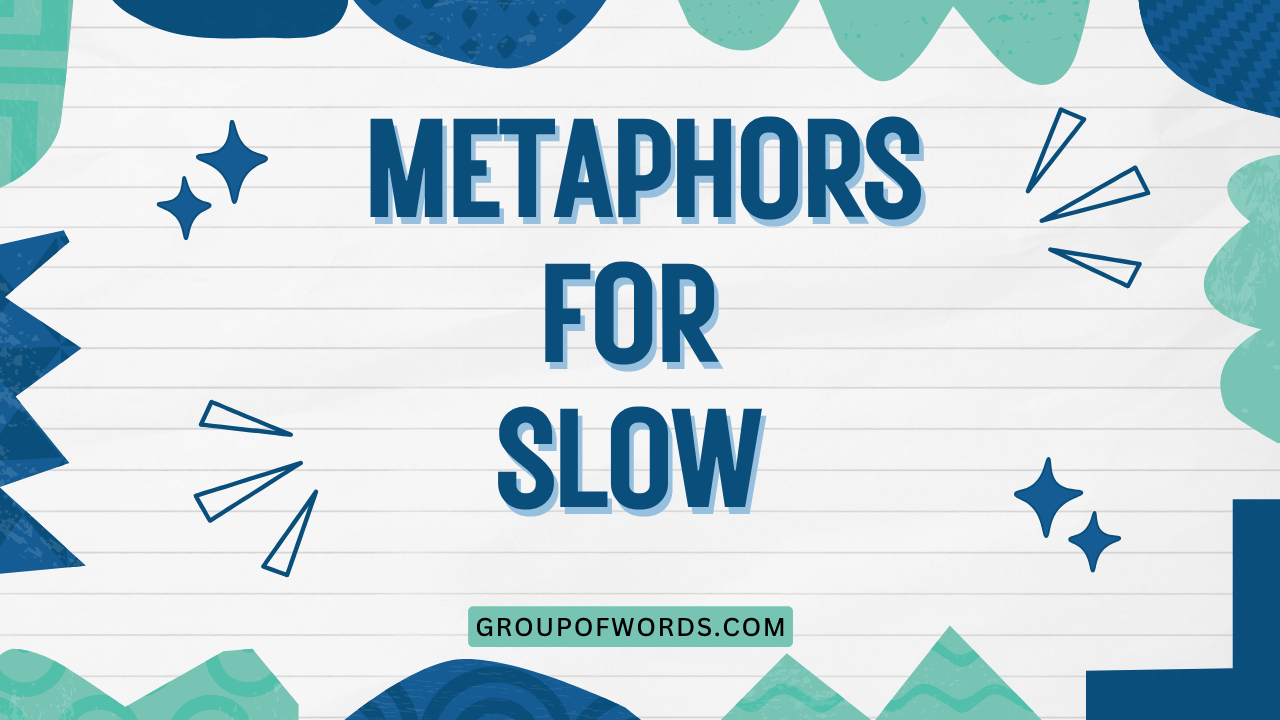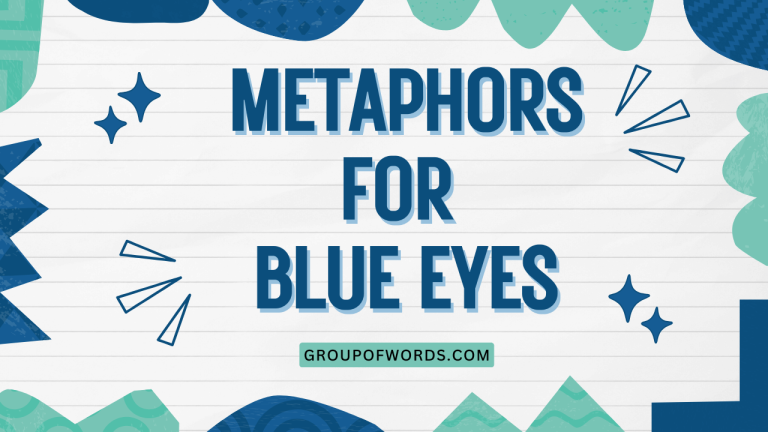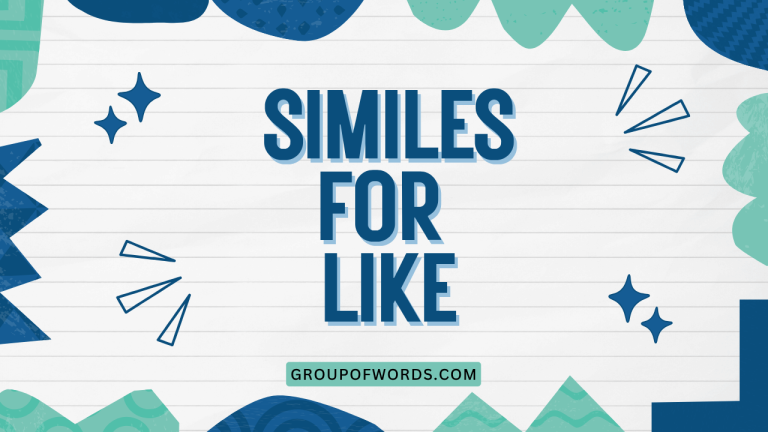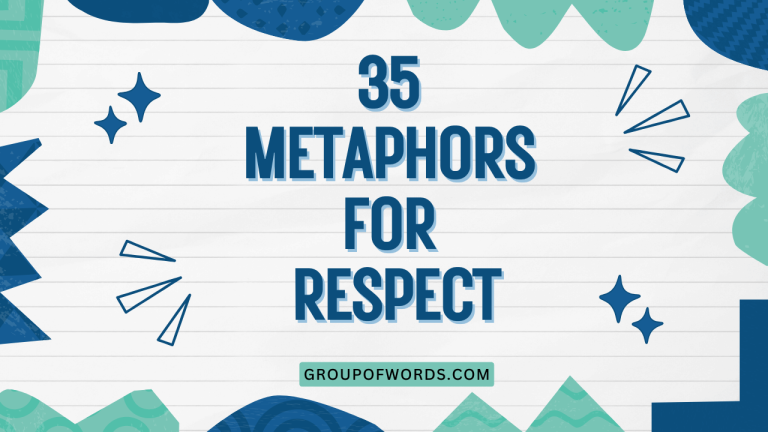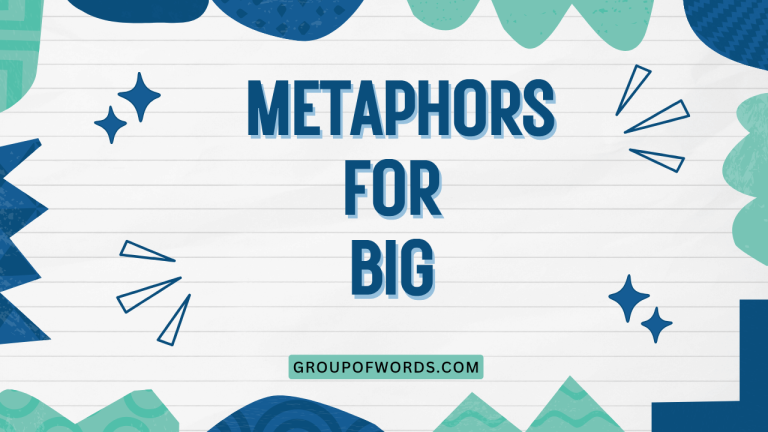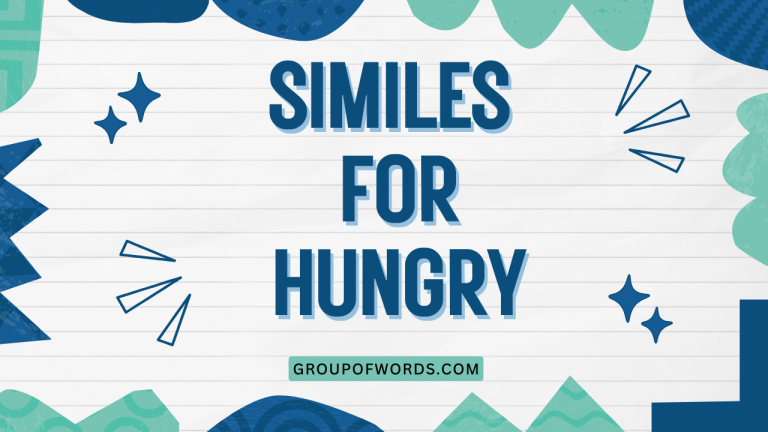Metaphors for Slow: A Comprehensive Guide
Metaphors are powerful tools that enrich our language, allowing us to express abstract ideas and complex emotions in vivid and relatable ways. When describing the concept of slowness, metaphors can be particularly effective, painting a picture in the listener’s or reader’s mind that goes beyond a simple statement of fact.
Understanding these metaphors not only enhances comprehension but also improves your own ability to use English creatively and expressively. This article offers a detailed exploration of metaphors for “slow,” examining their various forms, meanings, and applications, suitable for English learners of all levels.
This guide is designed for anyone looking to deepen their understanding of English idioms, figurative language, and creative writing. Whether you are an ESL student, a writer seeking inspiration, or simply someone who enjoys exploring the nuances of language, this article will provide valuable insights and practical examples.
By the end of this comprehensive exploration, you’ll be equipped to recognize, interpret, and utilize metaphors for “slow” with confidence and precision.
Table of Contents
- Definition of Metaphor and Slowness
- Structural Breakdown of Slow Metaphors
- Types and Categories of Metaphors for Slow
- Examples of Metaphors for Slow
- Usage Rules for Metaphors of Slow
- Common Mistakes When Using Metaphors for Slow
- Practice Exercises
- Advanced Topics
- Frequently Asked Questions
- Conclusion
Definition of Metaphor and Slowness
A metaphor is a figure of speech that directly compares two unrelated things, asserting that one thing is another, not just like it (which would be a simile). Metaphors are used to create vivid imagery, evoke emotions, and simplify complex concepts by relating them to something more familiar. They work by transferring qualities or characteristics from one thing to another.
Slowness, in the context of this article, refers to a lack of speed or quickness, both literally and figuratively. It can describe the pace of movement, the rate of progress, or even the speed of mental processes. Metaphors for “slow” aim to illustrate this lack of speed or progress in a more engaging and memorable way.
The use of metaphors to describe slowness is particularly important because it allows us to convey not just the fact of being slow, but also the feeling or impact of that slowness. For example, saying “the process was like watching paint dry” is far more evocative than simply saying “the process was slow.”
Structural Breakdown of Slow Metaphors
Metaphors for slow typically follow a basic structure: A is B, where A is the subject being described as slow, and B is something that is inherently slow or associated with slowness. Understanding this structure helps in both interpreting and creating effective metaphors.
The key element in a successful metaphor for slow is the ground, the shared characteristic between A and B that makes the comparison meaningful. In the example “the traffic was a snail,” the ground is the slow pace of movement. Identifying the ground is crucial for understanding the intended meaning of the metaphor.
Effective metaphors often rely on cultural associations. For example, snails are universally recognized as slow creatures, making “a snail’s pace” a widely understood metaphor for slowness. However, some metaphors may be more culturally specific, requiring a deeper understanding of local customs or folklore.
Types and Categories of Metaphors for Slow
Metaphors for slow can be categorized based on the source of the comparison. This section explores several common categories, each with its own distinct flavor and application.
Animal Comparisons
Animals are a rich source of metaphors for slow, as certain creatures are widely recognized for their leisurely pace. These metaphors often leverage our inherent understanding of animal behavior to convey the sense of slowness.
Natural Phenomena
Natural processes, such as the movement of glaciers or the erosion of rock, provide another set of metaphors for slow. These comparisons often emphasize the gradual and relentless nature of slowness.
Object-Related Metaphors
Inanimate objects can also serve as metaphors for slow, particularly those associated with age, decay, or inefficiency. These metaphors often highlight the lack of dynamism or progress.
Activity-Based Metaphors
Certain activities, such as watching paint dry or waiting in a long line, are inherently slow and tedious. These activities provide relatable metaphors for describing other slow processes or situations.
Time-Related Metaphors
Time itself can be used metaphorically to describe slowness, often by emphasizing the perceived duration or lack of progress within a given time frame. These metaphors can be particularly effective in conveying frustration or impatience.
Examples of Metaphors for Slow
This section provides a comprehensive collection of metaphors for “slow,” organized by category. Each example is designed to illustrate the specific type of metaphor and its potential application.
Animal Comparison Examples
Animal comparisons are frequently used to convey slowness. Here are some illustrative examples, showing how different animals evoke various shades of slowness.
| Metaphor | Meaning | Example Sentence |
|---|---|---|
| Like a snail | Extremely slow, almost imperceptible movement. | The traffic was moving like a snail this morning. |
| A tortoise’s pace | Slow and steady, but ultimately making progress. | He worked at a tortoise’s pace, carefully completing each task. |
| Slower than molasses in January | Extremely slow, especially due to cold or difficulty. | The old computer ran slower than molasses in January. |
| Like a sloth | Slow and lazy, with minimal effort. | He moved through the day like a sloth, avoiding any strenuous activity. |
| At a snail’s gallop | An ironic expression for something that is supposedly fast but is actually very slow. | The promised improvements were arriving at a snail’s gallop. |
| Crawling like an ant | Moving very slowly and deliberately, often under a heavy load. | The trucks were crawling like ants up the steep hill. |
| Like a worm inching along | Progressing very slowly, with small, incremental movements. | The project was inching along like a worm, with little visible progress. |
| A three-toed sloth in quicksand | Stuck and moving exceedingly slow. | Trying to get the paperwork done felt like being a three-toed sloth in quicksand. |
| Like watching a herd of turtles race | A comically slow race. | The political debate moved like watching a herd of turtles race. |
| As slow as a herd of cows moving uphill | Moving at a sluggish pace. | The line at the DMV moved as slow as a herd of cows moving uphill. |
| Like a hibernating bear waking up | A sluggish and slow start to a task or day. | Getting started on the project was like a hibernating bear waking up. |
| As slow as a spider spinning its web | A slow, but intricate and delicate process. | The investigation unfolded as slow as a spider spinning its web. |
| Like a caterpillar crawling | Slow, deliberate, and inching forward. | Her progress on the novel felt like a caterpillar crawling. |
| As slow as a sleepy snail | Extremely slow and lethargic. | The service at the restaurant was as slow as a sleepy snail. |
| Moving like a tired toad | Slow, heavy, and lacking energy. | After the long day, he was moving like a tired toad. |
| Like a lumbering elephant | Slow, ponderous, and heavy movement. | The old machine operated like a lumbering elephant. |
| As slow as a snail climbing a mountain | Extremely slow and facing a difficult challenge. | The negotiations were as slow as a snail climbing a mountain. |
| Like a turtle in peanut butter | Stuck and moving exceedingly slow. | The project progress was like a turtle in peanut butter. |
| As slow as a poisoned snail | Very slow and likely to stop altogether. | His recovery was as slow as a poisoned snail. |
| Like a snail carrying a house on its back | Slow and burdened. | He felt like a snail carrying a house on its back, overwhelmed by responsibilities. |
Natural Phenomena Examples
Natural phenomena provide powerful metaphors for slowness, often emphasizing gradual change or resistance.
| Metaphor | Meaning | Example Sentence |
|---|---|---|
| Like watching paint dry | Extremely boring and slow. | The meeting was like watching paint dry. |
| Slower than a glacier moving | Extremely slow, almost imperceptible movement. | Progress on the construction project was slower than a glacier moving. |
| Like erosion | Gradual and almost imperceptible change or progress. | The company’s market share declined like erosion over time. |
| As slow as continental drift | Extremely slow, geological timescale. | The legal process moved as slow as continental drift. |
| Like the tides coming in | Slow and steady, but relentless progress. | The changes in the industry were happening like the tides coming in. |
| As slow as a dripping faucet | Slow but consistent, often annoying. | The information trickled out as slow as a dripping faucet. |
| Like a leaf falling in autumn | Slow, graceful, and inevitable decline. | His career was descending like a leaf falling in autumn. |
| As slow as sap running in winter | Very slow, almost stagnant. | The business was growing as slow as sap running in winter. |
| Like a stone gathering moss | Slowly accumulating something over a long period. | The project was gathering momentum like a stone gathering moss. |
| As slow as a sunrise on a cloudy day | A gradual and obscured beginning. | The realization dawned as slow as a sunrise on a cloudy day. |
| Like a mountain eroding | Slow and steady decline over an immense period. | Her health was failing like a mountain eroding away. |
| As slow as honey flowing uphill | Extremely slow and against the natural flow. | Getting the approval felt as slow as honey flowing uphill. |
| Like water finding its level | Slowly reaching an equilibrium or resolution. | The situation was resolving like water finding its level. |
| As slow as a tree growing | Slow but steady and persistent growth. | Her confidence grew as slow as a tree growing. |
| Like a river meandering | Slow, winding, and indirect progress. | The conversation meandered like a river, taking many turns. |
| As slow as dust settling | Extremely slow and nearly imperceptible. | The controversy faded as slow as dust settling. |
| Like a star dying | A slow and gradual decline. | His career was fading like a star dying. |
| As slow as the changing of the seasons | Slow, cyclical, and predictable. | The market trends shifted as slow as the changing of the seasons. |
| Like the formation of a stalactite | Extremely slow accumulation over a long period. | The knowledge accumulated like the formation of a stalactite. |
| As slow as the earth turning | Immeasurably slow, almost imperceptible. | The shift in public opinion was as slow as the earth turning. |
Object-Related Examples
Objects, particularly those that are old, broken, or inefficient, can effectively convey the sense of slowness.
| Metaphor | Meaning | Example Sentence |
|---|---|---|
| Like a broken record | Repetitive and unchanging, hence slow in progressing to something new. | His argument was like a broken record, repeating the same points over and over. |
| As slow as a rusty cog | Slow and creaky, lacking efficiency. | The old machine ran as slow as a rusty cog. |
| Like an old clock ticking | Slow and methodical, marking time without significant progress. | The investigation proceeded like an old clock ticking. |
| As slow as dial-up internet | Extremely slow data transfer. | Downloading the file was as slow as dial-up internet. |
| Like a steamroller | Slow but unstoppable. | The bureaucratic process moved like a steamroller. |
| As slow as a manual typewriter | Slow, requiring deliberate effort for each step. | Drafting the document felt as slow as using a manual typewriter. |
| Like a stalled engine | Slow to start or get going, often inefficient. | The project felt like a stalled engine, refusing to gain momentum. |
| As slow as an abacus calculating | Calculating with deliberate and visible effort. | Processing the data felt as slow as using an abacus. |
| Like an antique car starting on a cold morning | Slow and struggling to get going. | Getting the business running felt like starting an antique car on a cold morning. |
| As slow as a record skipping | Stopping and starting in a frustratingly slow manner. | The negotiations progressed as slow as a record skipping. |
| Like a wind-up toy running out of steam | Gradually slowing and losing energy. | His enthusiasm waned like a wind-up toy running out of steam. |
| As slow as a compass pointing north | Slow but eventually accurate. | The investigation was moving as slow as a compass pointing north. |
| Like molasses flowing uphill | Extremely slow and against resistance. | The negotiations progressed like molasses flowing uphill. |
| As slow as a stone rolling uphill | Slow and requiring great effort. | The recovery was as slow as a stone rolling uphill. |
| Like a rusty swing set | Slow, creaky, and lacking lubrication. | The old system operated like a rusty swing set. |
| As slow as a broken elevator | Slow and frequently stopping. | The project development was as slow as a broken elevator. |
| Like a paper jam | Slow and causing a complete halt. | The process ground to a halt like a paper jam. |
| As slow as a hand-cranked machine | Slow and requiring manual effort. | The data entry felt as slow as a hand-cranked machine. |
| Like a flat tire | Slow and difficult to move forward. | Trying to make progress felt like driving with a flat tire. |
| As slow as a leaky faucet | Slow and consistent, but ultimately wasteful. | Information trickled out as slow as a leaky faucet. |
Activity-Based Examples
Certain activities are universally recognized as slow and tedious, making them effective metaphors for slowness.
| Metaphor | Meaning | Example Sentence |
|---|---|---|
| Like watching grass grow | Extremely slow and boring. | Waiting for the decision was like watching grass grow. |
| As slow as waiting in line at the DMV | Infuriatingly slow and bureaucratic. | The process was as slow as waiting in line at the DMV. |
| Like reading the phone book | Tedious and slow, with little reward. | The task felt like reading the phone book. |
| As slow as untangling Christmas lights | Slow and frustrating. | The project was progressing as slow as untangling Christmas lights. |
| Like counting grains of sand | Slow, tedious, and seemingly endless. | The inventory process felt like counting grains of sand. |
| As slow as listening to hold music | Monotonous and slow, with no progress. | Being on hold felt as slow as listening to hold music. |
| Like peeling an onion, layer by layer | Slow and methodical, revealing something gradually. | The investigation unfolded like peeling an onion, layer by layer. |
| As slow as teaching a cat to fetch | Difficult and slow, with limited success. | Getting him to understand the concept was as slow as teaching a cat to fetch. |
| Like knitting a sweater with one needle | Slow, awkward, and inefficient. | Completing the report felt like knitting a sweater with one needle. |
| As slow as explaining quantum physics to a child | Difficult and slow to achieve understanding. | Trying to explain the new policy was as slow as explaining quantum physics to a child. |
| Like watching a dripping tap fill a bucket | Slow and almost imperceptible progress towards a goal. | Saving enough money felt like watching a dripping tap fill a bucket. |
| As slow as trying to herd cats | Chaotic and difficult to manage or make progress. | Managing the team felt as slow as trying to herd cats. |
| Like watching a kettle boil | Slow and anticipated, but seemingly taking forever. | Waiting for the decision was like watching a kettle boil. |
| As slow as waiting for water to freeze | Extremely slow and requiring patience. | The changes were happening as slow as waiting for water to freeze. |
| Like sorting through old photographs | Slow and nostalgic, with many distractions. | The research process felt like sorting through old photographs. |
| As slow as reading fine print | Slow and requiring intense concentration. | Understanding the contract terms was as slow as reading fine print. |
| Like deciphering hieroglyphics | Slow, complex, and requiring specialized knowledge. | Understanding the new system felt like deciphering hieroglyphics. |
| As slow as balancing a checkbook | Tedious and requiring meticulous attention to detail. | Reconciling the accounts was as slow as balancing a checkbook. |
| Like solving a Rubik’s Cube | Slow, complex, and requiring strategic thinking. | The problem felt like solving a Rubik’s Cube. |
| As slow as handwriting a novel | Slow and requiring extensive manual effort. | Writing the report felt as slow as handwriting a novel. |
Time-Related Examples
Time-related metaphors often emphasize the perceived duration or lack of progress within a given timeframe.
| Metaphor | Meaning | Example Sentence |
|---|---|---|
| Time stood still | Time seemed to slow down or stop completely. | During the accident, time stood still. |
| An eternity passed | A long period of time felt much longer than it actually was. | Waiting for the results felt like an eternity passed. |
| Slower than Christmas | Implies a long wait for something anticipated. | The week before vacation felt slower than Christmas. |
| At a glacial pace | Extremely slow and gradual progress. | The negotiations were moving at a glacial pace. |
| Time crawled | Time passed very slowly and tediously. | During the boring lecture, time crawled. |
| Moving in slow motion | Everything seems to be happening at a reduced speed. | The accident unfolded in slow motion. |
| A month of Sundays | A very long and tedious time. | It felt like a month of Sundays waiting for the package to arrive. |
| An age went by | A long and significant period of time. | It felt like an age went by before they announced the winner. |
| Time dragged on | Time passed slowly and unpleasantly. | The meeting was so boring that time dragged on. |
| One step forward, two steps back | Progress is slow or even regressive. | The project’s progress was one step forward, two steps back. |
| Like waiting for the ice age to end | An extremely long and seemingly endless wait. | Waiting for the bureaucracy to clear felt like waiting for the ice age to end. |
| As slow as a week without coffee | A long and difficult experience. | The workdays felt as slow as a week without coffee. |
| Slower than government bureaucracy | Extremely slow and inefficient processes. | Getting the permit approved was slower than government bureaucracy. |
| A lifetime to finish | Extremely long time to complete a task. | It felt like it would take a lifetime to finish the project. |
| Time stood still | A moment felt frozen or extended. | During the tense moment, time stood still. |
| Slower than a week in jail | A very long and unpleasant experience. | Waiting for the news was slower than a week in jail. |
| Eons passed | An extremely long and immeasurable period. | It felt like eons passed before the verdict was announced. |
| At a snail’s pace through eternity | Extremely slow and seemingly endless. | The project was moving at a snail’s pace through eternity. |
| Slower than molasses in winter | Very slow due to cold and viscous conditions. | The computer operated slower than molasses in winter. |
| Like a decade in dog years | A period that feels much longer due to difficulty or stress. | The last few months felt like a decade in dog years. |
Usage Rules for Metaphors of Slow
Using metaphors effectively requires careful consideration of context and audience. Here are some key rules to keep in mind:
- Clarity: Ensure that the metaphor is easily understood by your audience. Avoid obscure or overly complex comparisons.
- Relevance: The metaphor should be relevant to the subject being described. The shared characteristic (ground) should be clear and appropriate.
- Consistency: Avoid mixing metaphors or using multiple metaphors that contradict each other.
- Originality: While common metaphors can be effective, strive for originality to make your writing or speech more engaging.
- Tone: Consider the tone and purpose of your communication. Metaphors can be used to add humor, emphasize a point, or evoke emotion.
Common Mistakes When Using Metaphors for Slow
Even experienced writers and speakers can make mistakes when using metaphors. Here are some common pitfalls to avoid:
| Mistake | Incorrect Example | Correct Example |
|---|---|---|
| Mixed Metaphor: Combining two or more incompatible metaphors. | The project was a snail’s pace running at full steam. | The project was moving at a snail’s pace. (or) The project was running at full steam. |
| Clichéd Metaphor: Using an overused and unoriginal metaphor. | The process was like watching paint dry. | The process was like watching a glacier recede. |
| Inappropriate Metaphor: Using a metaphor that is not relevant or appropriate to the context. | The stock market crash was like a lazy sloth. | The stock market crash was like a sudden avalanche. |
| Unclear Metaphor: Using a metaphor that is difficult to understand or interpret. | His progress was like a quantum entanglement. | His progress was like a slow drip of water. |
Practice Exercises
Test your understanding of metaphors for slow with these exercises.
Exercise 1: Identify the Metaphor
Identify the metaphor for “slow” in each sentence.
| Question | Answer |
|---|---|
| 1. The investigation crawled along at a snail’s pace. | A snail’s pace |
| 2. Time stood still as we waited for the verdict. | Time stood still |
| 3. The old computer ran slower than molasses in January. | Slower than molasses in January |
| 4. The project moved like a rusty cog. | Like a rusty cog |
| 5. The process felt like watching grass grow. | Like watching grass grow |
| 6. His recovery was as slow as a snail climbing a mountain. | As slow as a snail climbing a mountain |
| 7. The negotiations were moving at a glacial pace. | At a glacial pace |
| 8. The traffic was like a herd of turtles racing. | Like a herd of turtles racing |
| 9. Drafting the document felt as slow as using a manual typewriter. | As slow as using a manual typewriter |
| 10. Progress on the construction project was slower than a glacier moving. | Slower than a glacier moving |
Exercise 2: Complete the Metaphor
Complete the following sentences with an appropriate metaphor for “slow.”
| Question | Answer |
|---|---|
| 1. The meeting was as interesting as __________. | watching paint dry |
| 2. The project moved like __________. | a snail |
| 3. Time passed __________. | at a glacial pace |
| 4. The old machine ran __________. | as slow as a rusty cog |
| 5. Waiting for the decision felt like __________. | an eternity |
| 6. The investigation crawled along __________. | like a caterpillar |
| 7. His progress was __________. | like molasses flowing uphill |
| 8. The traffic inched forward __________. | like a worm inching along |
| 9. The approval process was __________. | slower than government bureaucracy |
| 10. Her recovery progressed __________. | as slow as a poisoned snail |
Exercise 3: Create Your Own Metaphor
Write a sentence using a unique metaphor for “slow” to describe the following situations:
| Situation | Example Answer |
|---|---|
| 1. A slow internet connection. | The internet connection was like trying to drink from a straw with a pinhole. |
| 2. A slow-moving line at the grocery store. | The line at the grocery store was like a conga line led by a tortoise. |
| 3. A slow and tedious task at work. | The task was like trying to empty the ocean with a teaspoon. |
| 4. A slow and boring lecture. | The lecture was like watching ice melt in Antarctica. |
| 5. A slow and difficult recovery from illness. | The recovery was like navigating a maze blindfolded. |
Advanced Topics
For advanced learners, consider exploring the following topics related to metaphors for slow:
- Extended Metaphors: Developing a single metaphor over an entire paragraph or essay.
- Dead Metaphors: Metaphors that have become so common that they are no longer recognized as figurative language (e.g., “time flies”).
- Conceptual Metaphors: Underlying conceptual frameworks that shape our understanding of abstract concepts (e.g., “time is money”).
- Cultural Variations: How metaphors for slow differ across different languages and cultures.
- The role of metaphors in shaping perceptions: How metaphors can be used to influence how people understand and react to situations.
Frequently Asked Questions
Here are some common questions about metaphors for slow:
- What is the difference between a metaphor and a simile?
A simile uses “like” or “as” to compare two things, while a metaphor directly equates them. For example, “He is as slow as a snail” is a simile, while “He is a snail” is a metaphor.
- Why are metaphors useful?
Metaphors make language more vivid, engaging, and memorable. They can also help to simplify complex concepts and evoke emotions.
- How can I improve my use of metaphors?
Read widely, pay attention to how metaphors are used in everyday speech and writing, and practice creating your own metaphors. Consider the clarity, relevance, and originality of your metaphors.
- What are some common sources of metaphors?
Common sources of metaphors include animals, nature, objects, activities, and human experiences.
- How do I avoid using clichéd metaphors?
Be mindful of overused metaphors and try to come up with original comparisons. Look for fresh and unexpected ways to describe things.
- Can a metaphor be too complex?
Yes, a metaphor can be too complex. If the connection between the two things being compared is too obscure or requires specialized knowledge to understand, the metaphor will likely be ineffective and confusing for the audience. It’s important to ensure that the metaphor is clear and relatable to the intended audience, so they can easily grasp the
meaning.
- Can metaphors for “slow” be offensive?
While uncommon, metaphors for “slow” could potentially be offensive if they are used to describe people in a derogatory or belittling way, especially if they are linked to stereotypes or disabilities. Always consider the potential impact of your words and avoid using metaphors that could cause harm or offense.
- Are there any metaphors for “slow” that are universally understood?
Some metaphors, like “slow as a snail,” are widely understood across cultures due to the common perception of snails as slow creatures. However, the effectiveness and interpretation of metaphors can still vary depending on cultural context and individual experiences. It’s always best to consider your audience when choosing a metaphor.
Conclusion
Metaphors for “slow” offer a rich and varied way to express the concept of slowness in a more engaging and memorable manner. By understanding the different types of metaphors, their structural components, and the rules for effective usage, you can enhance your communication skills and add depth to your writing and speech.
Whether you are describing a slow process, a lack of progress, or the feeling of time dragging on, metaphors provide a powerful tool for conveying your message with clarity and impact.
Continue to explore and experiment with metaphors to discover new and creative ways to express yourself. The more you practice, the more adept you will become at using metaphors to enrich your language and connect with your audience on a deeper level.
So go forth, and let your words paint vivid pictures of slowness, capturing the essence of this fundamental human experience.
